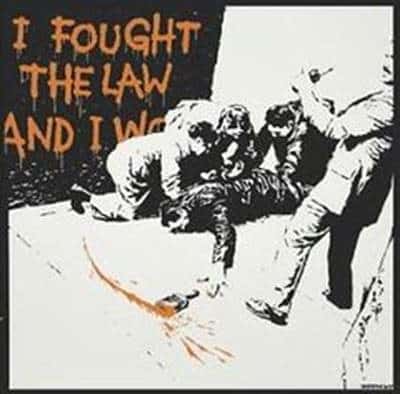“Banksy” is the pseudonym for an England-based artist, political activist, and film director whose real name and identity are unconfirmed.
As Smithsonian Magazine explains,
When Time magazine selected the British artist Banksy—graffiti master, painter, activist, filmmaker, and all-purpose provocateur—for its list of the world’s 100 most influential people in 2010, he found himself in the company of Barack Obama, Steve Jobs, and Lady Gaga. He supplied a picture of himself with a paper bag (recyclable, naturally) over his head. Most of his fans don’t really want to know who he is (and have loudly protested Fleet Street attempts to unmask him). But they do want to follow his upward trajectory from the outlaw spraying—or, as the argot has it, “bombing”—walls in Bristol, England, during the 1990s to the artist whose work commands hundreds of thousands of dollars in the auction houses of Britain and America. Today, he has bombed cities from Vienna to San Francisco, Barcelona to Paris, and Detroit. And he has moved from graffiti on gritty urban walls to paint on canvas, conceptual sculpture, and even film, with the guileful documentary Exit Through the Gift Shop, which was nominated for an Academy Award.
He’s known for his artistic provocations, including a painting that started to shred itself after selling for $1.4 million and that was recently resold for $25.4 million.
Like many others in the art world, Banksy has recently gotten into non-fungible tokens (NFTs), which are not intellectual property (IP) in themselves but function like digital receipts for artworks and other items.
According to ARTnews, Banksy’s work “Love is in the Air” is to be fractionalized into 10,000 NFTs, “each representing a unique section of the painting” and offered for sale for about $1,500 each.
As savvy as he is about commercializing his work, Banksy has also lost control over his own IP in recent years.
As Lawyer Monthly reported, following decisions from the European Union Intellectual Property Office (EUIPO), several trademarks belonging to Banksy have been invalidated:
The EUIPO cancellation division has now invalidated a series of Banksy’s figurative trademarks, of which the decisions concerning ‘Flower Thrower’[1] and ‘Monkey Sign’[2] were the most widely reported and commented on, the trademarks were actually registered by Pest Control Office Limited (“Pest Control”), the company which represents Banksy in public and authenticates his artworks. Banksy still holds a portfolio of other trademarks for his images and artworks, and it would not be surprising to see the rest of his portfolio also being challenged on similar grounds. While there may be doubts as to whether he will prevail in defending them, he has since applied to re-register some of the canceled trademarks.
As Lawyer Monthly noted,
At the heart of trademark legislation lies the protection of commercial interests and brand assets whereas copyright, on the other hand, is aimed at protecting the artist’s creativity. Relying on a trademark simply because copyright protection is not afforded for a particular artwork will not be accepted by the EUIPO as a satisfactory reason to retain that trademark.
Banksy’s anonymity prevents him from asserting copyright in his work, which thus prevents him from suing for violation of his copyright when others make unauthorized copies of his works.
His trademarks were challenged by a company called Full Colour Black Limited (FCB), which sells unauthorized copies of Banksy’s works in the form of greeting cards.
FCB argued that Banksy “acted in bad faith because he sought to circumvent the requirements of copyright law by seeking to monopolize images of his works without disclosing his identity.”
Just like the haiku above, we like to keep our posts short and sweet. Hopefully, you found this bite-sized information helpful. If you would like more information, please do not hesitate to contact us here.


